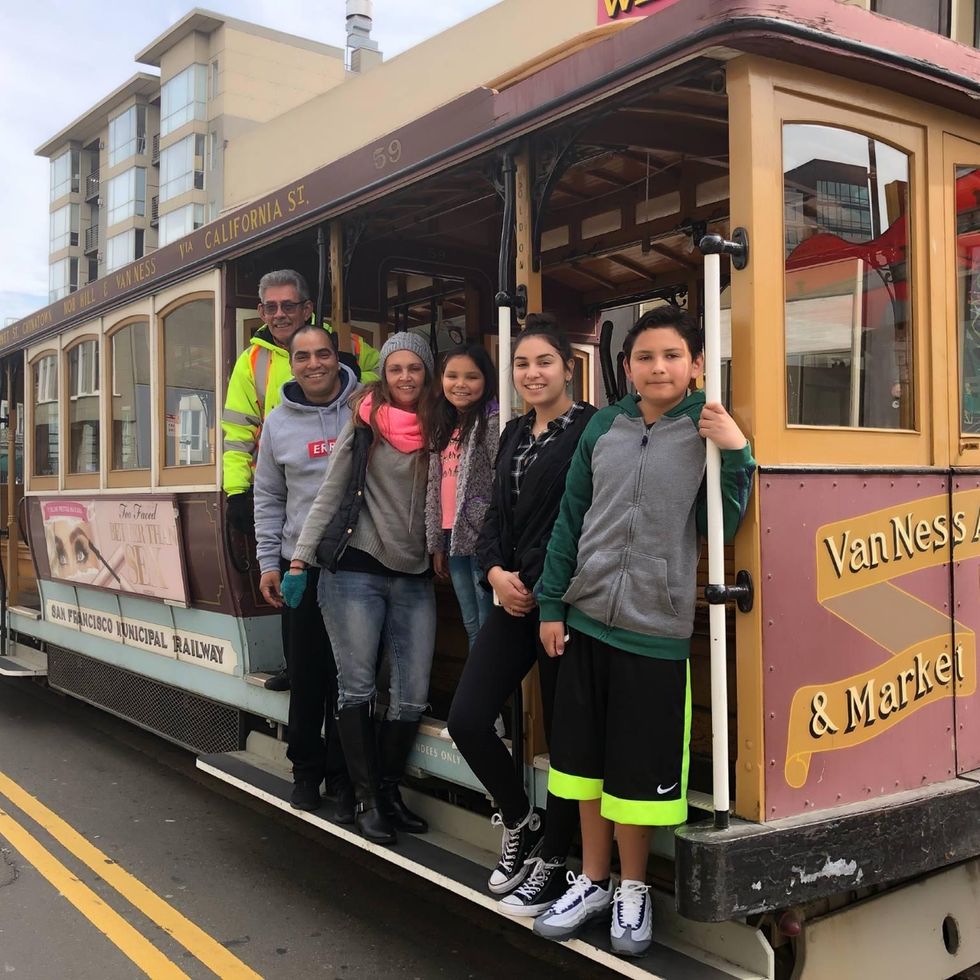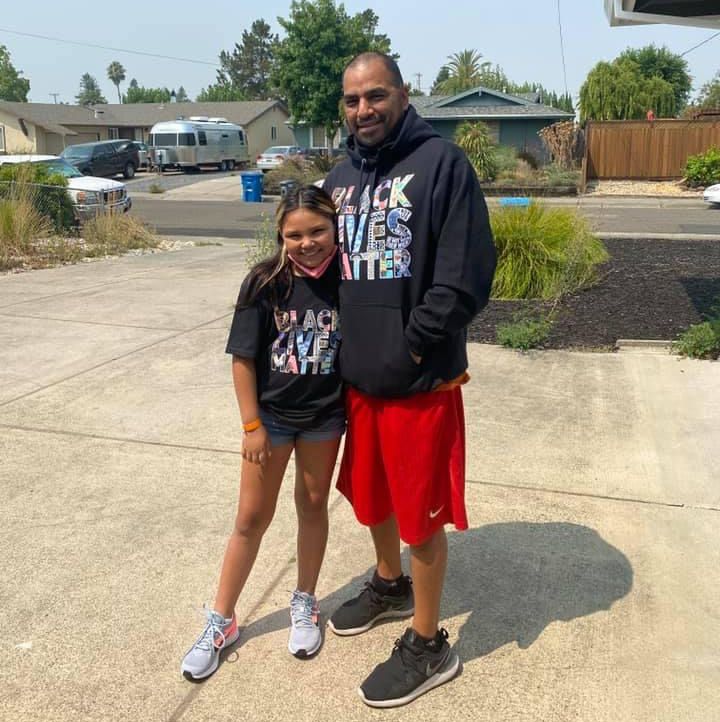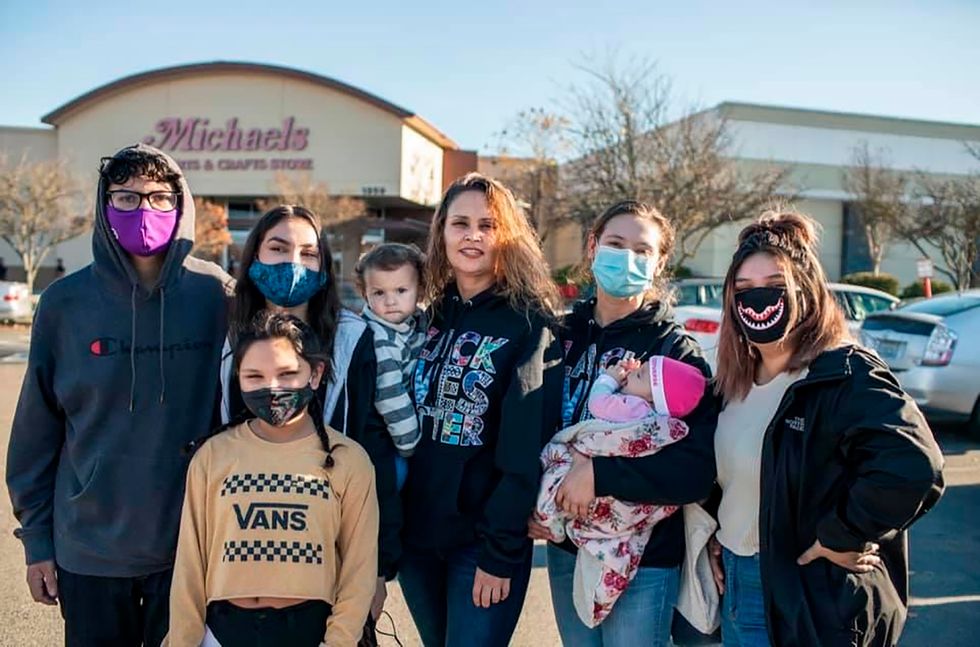In this piece, originally published in April 2022, Sadie Vega-Martinez and her husband, Eddie Martinez, spoke out in detail for the first time after being accused of attempted kidnapping outside a Michaels craft store. One year later, Katie Sorensen, the woman who accused the Martinez family of attempted kidnapping, was convicted of a making a false report of a crime. According to court records obtained by ELLE, she was charged with three misdemeanor counts of making a false report of a crime. She was acquitted of the first two counts, but found guilty on the third count. According to The Press Democrat, Sorensen showed “no emotion” as the verdict was read and was “quickly placed in handcuffs and led from the courtroom.”
Sadie Vega-Martinez, speaking exclusively with ELLE about Sorensen’s conviction, said she was “happy” with the verdict. “After [Sorensen] avoided accountability for years, and then hearing she was found guilty and walked out in handcuffs... yes, justice was served,” Vega-Martinez said. “I feel like it’s a step in the right direction for my family. I’m grateful for the support.”
According to a June 2023 press release, Sorenson was sentenced to 90 days in jail, 60 of which can be served on a work release program. She was “immediately remanded after sentencing to serve her sentence,” according to the release. She has also been placed on 12 months of “informal probation”—that means no social media presence.
Sadie Vega-Martinez needed to find baby Jesus. On December 7, 2020, the mother of five threw her hair up in a messy bun, pulled on sweats, and dragged her husband Eddie to the Michaels craft store five minutes from their home in Petaluma, California. She was on a mission to complete a nativity scene for her Christmas table. As they wove through aisles of Puffy paints, jars of glitter, and rainbow-colored yarn, Sadie didn’t notice the blonde-haired, blue-eyed mom pushing a double stroller and eyeing her and Eddie suspiciously. “We never would have even known she existed,” Sadie tells me. “No encounter, nothing.”
If there had been, what happened next might have made a lot more sense.
The blonde woman, micro-momfluencer Katie Sorensen (@motherhoodessentials on Instagram), certainly noticed Sadie and Eddie. In a two-part Instagram video filmed from the driver’s seat of her SUV six days later, Sorensen spun a terrifying tale about a “[not] clean-cut” man and woman who nearly succeeded in kidnapping her two young children. Sorensen claims the couple started talking about her kids’ ages and fair complexions somewhere near the spray-paint aisle, then followed them out to the parking lot. According to Sorensen, the couple held hands and walked about halfway around her car several times before the man tried to snatch her stroller. “By the absolute grace of God,” Sorensen says in the video, an elderly man parked nearby noticed what was going on, and the couple ran to their own car and sped away. “I want to share that story with you in an effort to raise awareness as to what signs to look for,” Sorensen says, eyes wide, voice shaking as she films, “and to encourage parents to be more aware of their surroundings.”
In reality, her frantic warning succeeded only in shining a spotlight on herself. Sorensen’s video gained her a flood of new Instagram followers, an interview with the local news, and an outpouring of online support from terrified moms. But police said an investigation into the incident produced no evidence that a crime had taken place. Now Sorensen herself is scheduled to be on trial in May. Instead of nearly being one of the extremely rare stranger abductions in the U.S. every year, the truth may turn out to be something less surprising: a white woman painting herself as the victim, when she is actually the aggressor.
More than a year later, Sadie is still consumed by questions. Why her? Why Eddie? Why in the glittering aisles of Michaels, the beloved mecca for hobby enthusiasts? The couple, who both have Nicaraguan parents, grew up together in the Noe Valley neighborhood of San Francisco, where Eddie’s father has been a cable car conductor for more than 34 years. They got together in 2000, and seven years later, moved 40 miles north to the largely white town of Petaluma, looking for a quiet place with a suburban feel to raise their family.
Ronald Reagan’s famous “It’s Morning Again in America” campaign commercial was partly filmed in Petaluma, and just like in the ad, the neighbors all seem to know one another. “It seemed like a great place [for] children,” says Eddie, who works as a local UPS driver. Sadie operates a small business from home making balloon arches for birthday parties. “She can do anything better than what you’d buy in the store,” Eddie brags. Sadie makes all their kids’ Halloween costumes out of thrift-store finds and lends her sewing talent for school plays. At their eldest daughter’s quinceañera, she hand-decorated salsa jars for each table. When one guest asked for the name of their party planner, “Sadie was like, ‘I did this myself!’” Eddie says. For many years, the Martinezes and their five kids were happy in Petaluma, even if there was the occasional slight, like when a bully told one of their kids to “go back” to where she came from. “They’ve been raised and taught that those are other people’s issues, not ours,” Sadie says.
Sometime after leaving Michaels “paralyzed with fear,” as Sorensen told a local TV station, she headed to the Petaluma police headquarters, where she told officers she wasn’t interested in having anyone arrested—only in raising awareness about “suspicious behavior,” according to a department press release. After taking her report that the couple had followed her and “loitered suspiciously” (she didn’t allege that anyone tried to take the stroller at this time), officers searched the area and determined no crime had been described, and decided not to issue a public notice, according to a department statement. Seemingly unsatisfied by the police’s response, Sorensen started a one-woman awareness campaign.
On December 13, she uploaded the two-part video, which was reportedly viewed 4.5 million times before being taken down. The video contained crucial information left out of Sorensen’s original statement to police, including the allegation that the man had tried to snatch her stroller. If true, such behavior could constitute attempted child abduction, a criminal offense under California law that could carry a potential prison sentence of up to 11 years. Within hours, the near-abduction had become a hot topic in Petaluma community Facebook and Nextdoor groups. “I was seeing all these alarmist posts, like ‘Be careful,’ ” says journalist Kathryn Palmer, who wrote about the incident for Petaluma’s newspaper the Argus-Courier. “It kept on coming up in every conversation.”
The town’s history of making headlines for child abduction only added fuel. On October 1,1993—nearly four miles from Michaels—a dimpled 12-year-old named Polly Klaas was taken at knifepoint from a slumber party by a stranger with a long record of serious offenses and was later found strangled to death. Galvanized by a widespread fear felt by California communities, state legislators adopted a controversial “three strikes and you’re out” policy that keeps repeat felony offenders in prison for 25 years to life upon conviction of a third serious crime.
Petaluma police began another investigation based on Sorensen’s assertions in the Instagram videos. This time, according to the police department, Sorensen told officers she wanted the couple prosecuted.
That afternoon, as baby Jesus lay nestled in his manger, Sadie felt a tap on her shoulder. “Mom, is this you?” her daughter asked, pointing to her phone. A friend in her group chat had forwarded a community alert from Petaluma police with a blurry screenshot of the accused couple at the Michaels checkout counter. Sadie recognized the man’s black hoodie with a Black Lives Matter logo. She had bought it for Eddie. When Sadie showed her husband, he was utterly confused. “Like, ‘What was her objective, her endgame for all of this?’ ” Eddie says. A few hours later, Sadie received a Facebook message from Petaluma police asking her and Eddie to come to the station. “It didn’t seem real,” Sadie says. “Like, ‘This has to be a joke.’”
How did a trip to the store to buy holiday decorations turn into...this?
Their minds reeling, they consulted an attorney in the family and agreed to fully cooperate with police. “For Sadie and me, it was game on,” Eddie says. “We needed to defend ourselves.” As they sat before investigators telling their side of the story, dozens of their friends got to work, flagging Sorensen’s video to Instagram as inappropriate content; the Martinezes also say families to whom Eddie delivers packages called the police department to vouch for his character. “I’m married to a UPS man who’s like Norm from Cheers—everybody knows him,” Sadie says. “Katie should have probably done a little bit of homework and picked different characters for her story.”
After finding “no evidence or witnesses corroborating” Sorensen’s account, the investigation was closed on December 17, 2020. The next day, Petaluma’s police chief released a press statement announcing an investigation into whether the incident at Michaels was falsely reported, stating that “if evidence of a racially-motivated hate crime is found to have occurred we will seek prosecution to the fullest extent under the law.”
Sadie, who wondered whether she and Eddie had been singled out because of the color of their skin, hoped Sorensen would be charged with a hate crime. “But that’s very hard to prove,” she says, “so we had to be content with what we could get.” Several months later, Sorensen was charged with three misdemeanor counts of giving false reports to police. (She has not been charged with a hate crime.) Sorensen entered a plea of not guilty; if convicted, under California law, misdemeanors can carry a sentence of up to six months in jail or a fine of up to $1,000, or both. (Attempts to reach Sorensen directly and through her lawyer went unanswered.) Sadie and Eddie have both been subpoenaed and will appear in court on May 19, 2022.
Now a new thought keeps Sadie up at night: “Jail won’t fix the systems that allow the Katies of the world to do these things in the first place,” she says. “She’s just a little piece of a big puzzle.”
Sorensen’s family has ties to northern Virginia, and she studied early childhood and special education at Brigham Young University–Idaho. Sometime during her time there, she met and married David Sorensen, an outdoor enthusiast who documented his fishing and hunting exploits online. (David did not respond to a request for comment.) Later, the couple put down roots in California to raise their two children. David’s Facebook shows road trips down the Pacific Coast Highway, matching tie-dyed T-shirts, and big bonfires with friends.
Sorensen must have recognized the marketability of her family’s happiness. Her Instagram @motherhoodessentials was a pretty typical mom blog. She posted about the kids, clean beauty, and the benefits of CBD. She reportedly had 6,000 followers, and became a verified “Amazon Influencer,” allowing her to make money promoting everything from brightly colored baby utensils to Rachel Hollis books. In 2017, Sorensen and her mom, Jill Turgeon, launched a collection of baby bibs with sewn-in essential oil diffuser pads. She was also a self-described “independent wellness advocate” hawking essential oils from dōTERRA, the multilevel marketing company beloved by small- to mid-level influencers.
In the summer of 2020, months before Sorensen would go public with her alleged near-kidnapping, she took up the fight against sex trafficking, posting a 20-slide highlight reel to Instagram, called “SaveTheChildren,” where she shared aesthetically pleasing infographics begging social media companies to remove pedophilia accounts and promising to speak up on behalf of the “millions that fall victim to human trafficking every year.” In one slide, Sorensen uploaded footage from a rally where protesters held signs saying “Rise Up.” In another post to her grid, she posed in front of a theater’s marquee with the famous Dr. Martin Luther King Jr. quote: “The time is always right to do what is right.” She’s holding what appears to be a hand-drawn anti-trafficking sign. The caption leads with “Slavery still exists,” and contains the hashtag #savethechildren.
Many overly online moms hopped on the anti-trafficking train around that same time. Some of them expressed support for an obvious stance (that all children should be protected), while others (both knowingly and unknowingly) used the hashtag to spread malicious conspiracy theories associated with QAnon, including that top Democrats and Hollywood elites are running a child-trafficking operation.
The fervor was just the latest iteration of a favorite American pastime: moral panic. In the 1980s, “stranger danger” hysteria had a viselike grip on American parents, spurred by a string of high-profile kidnappings, starting in 1979 with the tragic disappearance and presumed strangulation of six-year-old Etan Patz in New York City, followed by names you might remember from the sides of milk cartons: Jacob Wetterling, Adam Walsh, and Petaluma’s own Polly Klaas. They weren’t just child victims, they were household names that white-knuckled parents swapped theories about, all at a time when communities across the country were grappling with busing, integrated schools, gay liberation, and women’s rights.
The supposed slipping away of “traditional family values” made millions feel unmoored. “All these things served to establish a stranger-danger logic that children are particularly vulnerable to abduction by strangers at a given moment because of historical circumstances,” says Florida State University assistant professor of history Paul Renfro, author of Stranger Danger: Family Values, Childhood, and the American Carceral State. “There are quite a few linkages that can be drawn to what we’re experiencing now,” he adds, citing the #MeToo movement, the racial justice reckoning, economic mood swings. Not to mention polarization. This complex pastiche reemerged during lockdown as parents had a lot more time to doom-scroll. Those looking for something more to worry about found any number of wild claims to glom on to.
According to one survey conducted by political scientists Joseph Uscinski and Adam Enders in 2020, around half of the participants believe that 300,000 or more children are victims of sex trafficking, and one of four participants think that number is much higher. Child trafficking does happen in the U.S., and it’s a horrific crime, but the reality is a far cry from the stereotypical image stamped into anxious parents’ heads. It mostly impacts children who are economically and socially vulnerable, usually living in poverty or foster care. Rather than being ripped from their beds in the dead of night, most young people are trafficked by lovers or parents for money or drugs.
Kidnapping also happens, but it rarely involves strangers forcing children into white vans. According to data from the National Center for Missing & Exploited Children, out of the 29,782 missing children cases the nonprofit assisted authorities with in 2020, only 79 were “non-family abductions.” That’s in contrast to 1,396 “family abductions” that year, in which a child was taken, wrongfully retained, or concealed by a parent or other family member depriving another of their custody or visitation rights. Surely each of the 79 stranger abductions was terrifying, but it’s a far cry from 300,000. That spurious figure, still touted by some politicians, traces back to misleading data from the 1990s, according to a 2015 Washington Post fact-check.
The sad truth is, the largest percentage of missing children in the U.S. are runaways who are often homeless, addicted, abused, or rejected—many of them lost before they ever leave home, according to the U.S. Department of Justice.
It is not, of course, a grift to care about the exploitation of children, which is both real and harmful. But disproportionate concern online can have negative real-life consequences. More than 120 anti-trafficking organizations penned an open letter in October 2020 criticizing the spread of baseless sex-trafficking conspiracy theories, like the wildly insane (and patently false) claim that furniture and home goods company Wayfair trafficks children. “Any time we spend engaging these lies necessarily distracts from the real work needed to combat human trafficking,” the group said. “We urge you to engage real needs rather than politically motivated and profoundly dangerous narratives that harm the very people who they claim to be speaking for.”
Last year, TikToker Paige MarieParker, a tarot card reader with over 174,000 followers, posted a video repeating a rumor about traffickers in North Carolina placing car seats in parking lots as bait. Police debunked the theory, but not before Parker’s video reportedly racked up over 12 million views. When reached via email late last year, Parker expressed regret. Kind of. “I don’t want to misinform anyone,” Parker said. “I just want to make sure that men, women, and children are safe.” Experts say that the problem with these types of “awareness” videos is that once an account of trafficking goes viral—real or not—legitimate nonprofits like the National Human Trafficking Hotline receive a flurry of concern that hogs time and resources. “When we get thousands of [calls] from people who read a story on the internet, there could be [a real survivor] waiting,” says Robert Beiser, director of the Strategic Initiative in Sex Trafficking at Polaris, the nonprofit that runs the hotline. “If they really care about trafficking, our hope is that they also care about solutions...and not just [what] they read on social media.”
The rumor around town, Sadie says, is that Sorensen has relocated out of state. In her last post from December 14, 2020, Sorensen describes being “grateful” that her videos “have served many fellow parents, and have been a reminder to always stay vigilant.” The account—changed to @motherhoodessentials_ (with an underscore at the end) and now private, though not deleted—still has over 64,000 followers (down from a reported 80,000 at the height of the hysteria). Her mother, Jill Turgeon, has called the case against her daughter “baffling” and “completely misguided,” on a GoFundMe page that’s raised $2,300 of its $50,000 goal to purportedly cover her daughter’s legal fees. “The tables have been turned,” Turgeon writes in part on the page. “To say that this is a nightmare is a profound understatement.”
While Sorensen remains out of sight, Sadie has never been more visible, using the hashtag #ProsecuteKatie in TikTok videos she’s uploaded about the incident. Last March, Petaluma mayor Teresa Barrett appointed Sadie to the town’s police oversight committee, where Sadie presented her own version of a San Francisco law allowing people reported to the police for unfair or unnecessary reasons to seek justice (it hasn’t been adopted). It’s called the Caution Against Racial and Exploitative Non-Emergencies Act, or the CAREN Act. “I will always speak up and support people, especially when it comes to racism in Petaluma,” Sadie says. “[Katie] was trying to spread awareness about something that never happened, when in actuality people should be aware of people like her.”
By now, many of those who believed Sorensen’s wild tale have learned the other side of the story. Still, there are faceless “keyboard warriors,” as Sadie calls them, who may continue to subscribe to an alternative reality. A conviction for Sorensen might bring some comfort, but it won’t fix the embarrassment or the pain of being at the center of a very public police investigation. Just when she starts to move past it, Sadie will face a reminder, like the other day in T.J. Maxx when another shopper, an older white woman, noticed her and whispered, “Watch out for child abductors” to her friend. “I have a fan club,” Sadie says with a sigh. “We are learning to live with the fact that our faces are tied to child abduction.”
It took her six months to return to Michaels. This time, Sadie put on a full face of makeup and wore her hair down. She grabbed some poster board and felt tip pens, and quickly checked out. “[We’re] more hesitant when we leave the house, because we have targets on our backs,” she says. “I’m a confident person, so this won’t drive me crazy.” For a master craftswoman like Sadie, it’s going to take a lot more for her to become unglued.
This article appears in the April 2022 issue of ELLE.



















